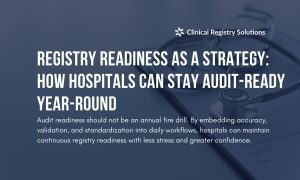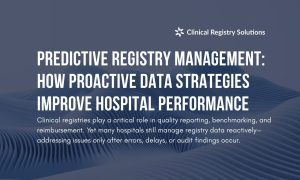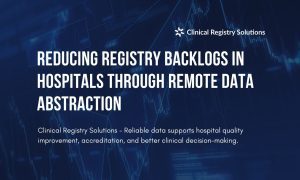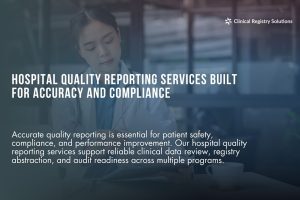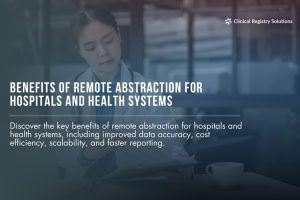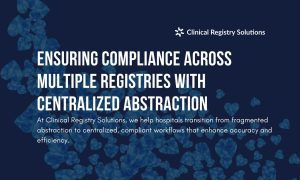- Role Overview: Clinical data abstractors extract and validate medical data for registries, ensuring accuracy and compliance.
- Essential Skills: Attention to detail, medical terminology knowledge, registry expertise, EHR navigation, analytical skills, time management, and communication.
- Training Pathways: Certifications (AHIMA, ACDIS, NAHQ), hands-on experience, and staying updated on registry changes.
- Importance: Accurate abstraction supports quality improvement, accreditation, and reimbursement for hospitals.
- Partner Benefits: Clinical Registry Solutions offers expert training and support for abstractors, specializing in cardiac, stroke, and surgical registries.
- Future Trends: AI and automation are enhancing abstraction efficiency, requiring abstractors to adapt to new tools.
Understanding Clinical Data Abstraction
Clinical data abstraction is a vital process in healthcare, involving the extraction, review, and validation of medical data from patient records for submission to registries, research databases, or quality improvement programs. Whether for the ACC NCDR, STS, NSQIP, or Get With The Guidelines (GWTG), skilled abstractors ensure hospitals meet compliance and performance goals.
Top providers like Clinical Registry Solutions empower healthcare organizations with expert abstraction services, ensuring accurate reporting and regulatory alignment. But what defines a great clinical data abstractor?
Core Skills of a Successful Clinical Data Abstractor
To excel in clinical data abstraction, professionals need a blend of technical expertise and soft skills. Here are the essentials:
- Precision & Attention to Detail
🔍 Errors in abstraction can skew quality metrics or lead to compliance issues. A great abstractor:
✔ Maintains meticulous accuracy
✔ Validates data against registry definitions
✔ Cross-checks information for consistency - Mastery of Medical Terminology & Coding
📑 Proficiency in ICD-10, CPT codes, and clinical terminology is non-negotiable. Abstractors must interpret complex medical records and align them with registry standards. - Registry Expertise
🏥 Familiarity with major registries is critical, including:
✅ ACC NCDR (CathPCI, ACTION, AFib Ablation)
✅ STS (Society of Thoracic Surgeons)
✅ NSQIP (National Surgical Quality Improvement Program)
✅ GWTG (stroke, heart failure, and resuscitation) - Electronic Health Record (EHR) Proficiency
💻 Navigating EHR systems like Epic, Cerner, Meditech, or Allscripts is essential for efficient data extraction and integration. - Analytical & Problem-Solving Abilities
📊 Abstractors often face ambiguous documentation or incomplete records. They must:
✔ Apply registry guidelines logically
✔ Resolve discrepancies with clinical teams
✔ Ensure data integrity - Time Management & Efficiency
⏳ High-volume abstraction demands meeting deadlines without sacrificing quality. Skilled abstractors balance speed and precision. - Effective Communication & Teamwork
💬 Collaboration with quality teams, physicians, and auditors is frequent. Clear communication ensures data accuracy and alignment with hospital goals.
How to Train for Clinical Data Abstraction
Becoming a top-tier clinical data abstractor requires targeted education and practical experience. Here’s how to get started:
- Certifications & Training Programs
🔹 Enroll in courses like Data Abstractor Academy for structured learning.
🔹 Pursue certifications from AHIMA (CCS, RHIA), ACDIS (CCDS), or NAHQ (CPHQ) to boost credibility and expertise. - Hands-On Experience 💼 Internships or roles with abstraction providers like Clinical Registry Solutions offer real-world training. On-the-job mentorship hones practical skills.
- Staying Current with Registry Updates 📢 Registries like NCDR and STS evolve regularly. To stay compliant:
✔ Attend ACC, AHA, or STS conferences
✔ Participate in webinars and registry networks
✔ Monitor CMS and AHA guideline updates
Why Training Clinical Data Abstractors Matters
Hospitals rely on accurate data to drive quality improvement, secure accreditation, and maximize reimbursement. Well-trained abstractors ensure:
✅ Precise registry submissions
✅ Reliable quality metrics reflecting true patient care
✅ Compliance with CMS, Joint Commission, and other standards
Investing in abstractor training reduces errors, enhances efficiency, and strengthens hospital performance in value-based care models.
Conclusion: Partner with Clinical Registry Solutions for Expert Training
Whether you’re an aspiring abstractor or a hospital seeking to upskill your team, Clinical Registry Solutions offers comprehensive training programs tailored to cardiac, stroke, and surgical registries.
🔹 Specialized education for NCDR, STS, NSQIP, and GWTG
🔹 AI-enhanced tools for cutting-edge abstraction
🔹 Dedicated support to elevate your team’s performance
📞 Contact us today to advance your career or empower your hospital’s data abstraction efforts!
🚀 Visit www.clinicalregistrysolutions.com for more information.
FAQ
What does a clinical data abstractor do?
A clinical data abstractor extracts and validates medical data from patient records for registries, ensuring accuracy for quality reporting, research, and compliance.
What skills are essential for a clinical data abstractor?
Key skills include attention to detail, medical terminology knowledge, registry expertise, EHR proficiency, analytical thinking, time management, and communication.
How can I become a clinical data abstractor?
Pursue certifications (e.g., AHIMA, ACDIS), enroll in training programs like Data Abstractor Academy, and gain hands-on experience through internships or roles with providers like Clinical Registry Solutions.
Why is training important for clinical data abstractors?
Training ensures accurate registry submissions, compliance with standards, and reliable data for quality improvement and reimbursement.
How can Clinical Registry Solutions help with data abstraction training?
Clinical Registry Solutions offers tailored training programs, AI-driven tools, and expert support for abstractors working with major registries. Visit www.clinicalregistrysolutions.com to learn more.
